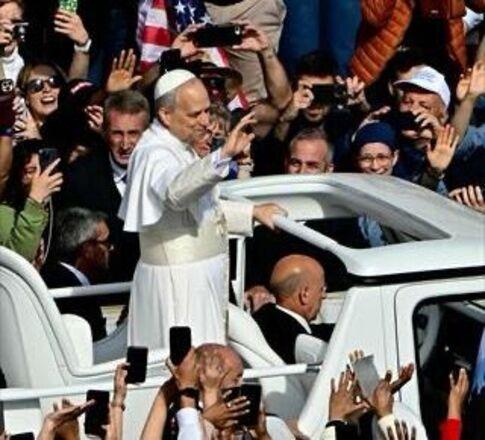You are here
Pope Leo XIV Mild-mannered American with global view
By AFP - May 18,2025 - Last updated at May 18,2025

Pope Leo XIV greets the crowd from the popemobile before a Holy mass for the beginning of his pontificate, in St Peter's square in The Vatican on May 18, 2025 (AFP photo)
VATICAN CITY — With 10 days under his belt as pope, Leo XIV has already shown himself to be a mild yet focused bridge-builder, with a soft spot for the underdog and a passion for tennis.
On May 8, Robert Francis Prevost made history as the first pope from the United States but his experience goes well beyond his Chicago roots.
The 69-year-old pontiff saw the challenges facing the worldwide Catholic Church up close in two decades as a missionary in the poor Andean nation of Peru, where he holds dual citizenship.
And he already has a keen grasp of the inner workings of the Vatican, thanks to two years in a powerful role within the Roman Curia.
With his calls this week for peace and in railing against inequality and social injustice, Pope Leo has drawn parallels with his reforming predecessor, Pope Francis, who died April 21.
But the quiet, understated American has already signalled a change in style with the charismatic and impulsive Argentine.
Vatican watchers are predicting his less confrontational tone may help him make inroads with those who may disagree with him -- inside and outside the Church.
- Playing priest -
Prevost was born on September 14, 1955, in a working-class, predominantly Catholic neighbourhood of Chicago to parents of French, Italian and Spanish descent.
From an early age, the future Leo played priest, buying candy discs to use as communion wafers and passing them out to other neighbourhood children, according to his older brother, Louis.
He recalled telling his six-year-old brother, "You're gonna be the pope."
Prevost attended a minor Augustinian seminary in St Louis as a novice, going onto take a mathematics degree from Philadelphia's Villanova University, an Augustinian institution.
In 1985, he joined the Augustinians in Peru for the first of two long missions in the country that came to strongly mark his character, according to those who know him.
An early sign of his global outlook came when he spoke Spanish from the balcony of St Peter's Basilica just minutes after being elected pope.
Locals in the northern Chiclayo diocese in Peru, where he was appointed apostolic administrator in 2014, have since described him as a calm and humble person, who would visit soup kitchens and don tall rubber boots to muck out homes during downpours.
He also had a big appetite for the local dish of chicharron, fried pork belly or chicken, and ceviche, or marinated raw fish.
A long-time fan of the Chicago White Sox baseball team, Leo is keen on tennis, describing himself as "quite the amateur tennis player".
An early perk of the job came this week when he met with world men's number one Jannik Sinner, who gave him a raquet and suggested a quick rally in the sumptuous setting.
"We'd better leave it," joked Leo.
'Can't turn back'
The new pope also knows his way around the Vatican.
In 2023, he was appointed by Francis to lead the Dicastery for Bishops, a key Vatican department that advises the pontiff on appointments, and later that year was made a cardinal.
Fellow prelates describe him as a pragmatic consensus builder, with a softer style than Francis but the same commitment to Catholics from the "peripheries" ,overlooked areas far from Rome , and a strong sense of social justice.
His awareness of global Church challenges was honed by two consecutive terms as the global head of the Augustinians, a mendicant order keenly focused on missionary work and charity.
He also has a masters in divinity from Chicago's Catholic Theological Union in 1982, and a doctorate in canon law in Rome, a grounding seen as reassuring to more conservative cardinals who have sought a greater focus on theology from the pope.
After Francis's 12-year papacy, which was marked by reforms but also divisions within the Church, the then Cardinal Prevost said there was "still so much to do".
"We can't stop, we can't turn back," he told Vatican News last month.
"We have to see how the Holy Spirit wants the Church to be today and tomorrow, because today's world, in which the Church lives, is not the same as the world of ten or 20 years ago.
"The message is always the same: proclaim Jesus Christ, proclaim the Gospel, but the way to reach today's people, young people, the poor, politicians, is different," he said.
















